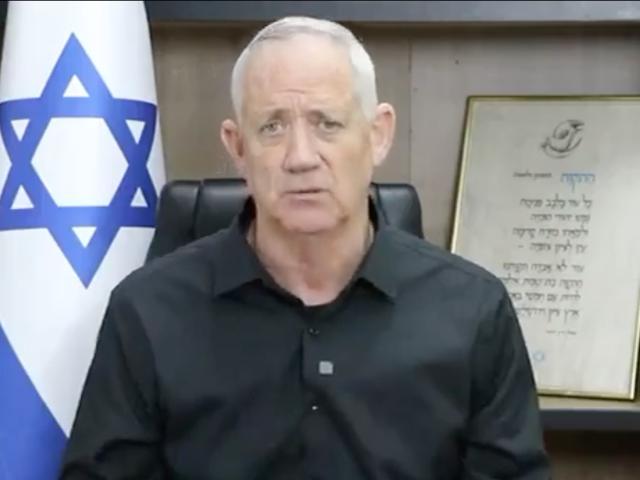Benny Gantz, a prominent member of Israel's war cabinet and leader of the centrist National Unity Party, has recently concluded his visit to the United States and is now headed to the United Kingdom for a significant one-day engagement, as confirmed by his office. This visit underscores Gantz's proactive approach to international diplomacy and reflects his rising prominence on the global stage.
Gantz's itinerary includes a pivotal meeting with UK Foreign Secretary David Cameron in London, highlighting the importance of Israeli-British relations in addressing current geopolitical challenges. This move comes at a critical juncture, given Gantz's unorthodox decision to visit Washington without formal Israeli government sanction, a move that bypassed customary diplomatic protocols, including the accompaniment of the Israeli ambassador in meetings with high-ranking US officials. This decision sparked considerable debate within Israel, drawing criticism from Prime Minister Benjamin Netanyahu, who currently navigates a precarious leadership position.
Secretary Austin, thank you for your unwavering commitment to Israel’s security and leading the important military coordination with CENTCOM.@SecDef pic.twitter.com/7BWmVbe7WK
— בני גנץ - Benny Gantz (@gantzbe) March 6, 2024
The US leg of Gantz's trip was notable for its direct engagements with key American political figures, including Vice President Kamala Harris, Secretary of State Antony Blinken, and Defence Secretary Lloyd Austin, among others. These meetings were crucial, as US officials conveyed a firm stance on the need for the Israeli government to facilitate greater humanitarian aid to Gaza, amidst growing international concern over the humanitarian situation there.
Secretary Blinken, thank you both for your support for the State of Israel, particularly since October 7th, and your commitment to ensure the safe return home of the hostages still brutally held captive in Gaza.@SecBlinken pic.twitter.com/uGfBQfzcxc
— בני גנץ - Benny Gantz (@gantzbe) March 6, 2024
Gantz's actions suggest a deliberate attempt to highlight and address the internal divergences within Israel's war cabinet, particularly regarding the country's policies towards the Palestinians and its broader Middle Eastern geopolitical strategy vis-à-vis the United States. Dan Avnon, a professor at the Hebrew University of Jerusalem, interpreted Gantz's moves as a clear departure from conventional political conduct, underlining the deep policy rifts within the Israeli leadership.
In London, discussions will primarily focus on similar themes, emphasizing the urgent need for humanitarian aid in Gaza and potential ceasefire initiatives. This visit amplifies the speculation that Israel's closest allies, notably the United States and the United Kingdom, are increasingly concerned with Netanyahu's stance on the Gaza conflict, especially regarding humanitarian issues.
Ending the war without clearing out Rafah is like sending a firefighter to extinguish 80% of the fire,' Minister Benny Gantz tells National Security Adviser Jake Sullivan.https://t.co/uLDykbE8ih
— Avraham Israeli Zionist 🇮🇱🇨🇦 (@IsraeliAvraham) March 5, 2024
The Biden administration, a staunch supporter of Israel, has faced domestic and international pressure to moderate its support due to the escalating human toll of the Gaza conflict, now exceeding 30,500 casualties according to local health authorities. President Biden's unwavering defense of Israel, despite the rising civilian casualties, has led to diminishing support among key voter demographics in the United States, underscoring the complex political ramifications of the conflict.
Amidst these developments, Gantz's engagement with international partners signals a readiness among Israel's allies to envisage a future leadership dynamic potentially more conducive to peace and stability in the region. Discussions with British officials, including a planned meeting with Lord Cameron, are expected to cover ceasefire strategies and the broader implications of Netanyahu's policies on regional peace efforts.
🇬🇧 | 🇮🇱 | 🇵🇸 UK to warn Israel that patience is running "thin" over Israel preventing aid going into Gaza.
— Censored Men (@CensoredMen) March 6, 2024
Britain's Foreign Secretary, David Cameron, is set to meet Benny Gantz of Israel's war cabinet today. pic.twitter.com/nd86LxAq26
The Biden administration's pursuit of a comprehensive peace agreement, incorporating Palestinian statehood and regional security assurances, starkly contrasts with Netanyahu's opposition to these initiatives. Netanyahu's stance has frustrated efforts to broker peace deals, including previous attempts to secure hostage releases and manage the situation in Gaza.
Gantz's diplomatic outreach, therefore, represents not just a challenge to Netanyahu's leadership but also a critical exploration of alternative pathways to peace and stability in the Middle East. By engaging directly with key international allies, Gantz is positioning himself as a viable alternative leader who could navigate the complex geopolitical landscape more effectively, potentially paving the way for a new era in Israeli politics and Middle Eastern diplomacy.


